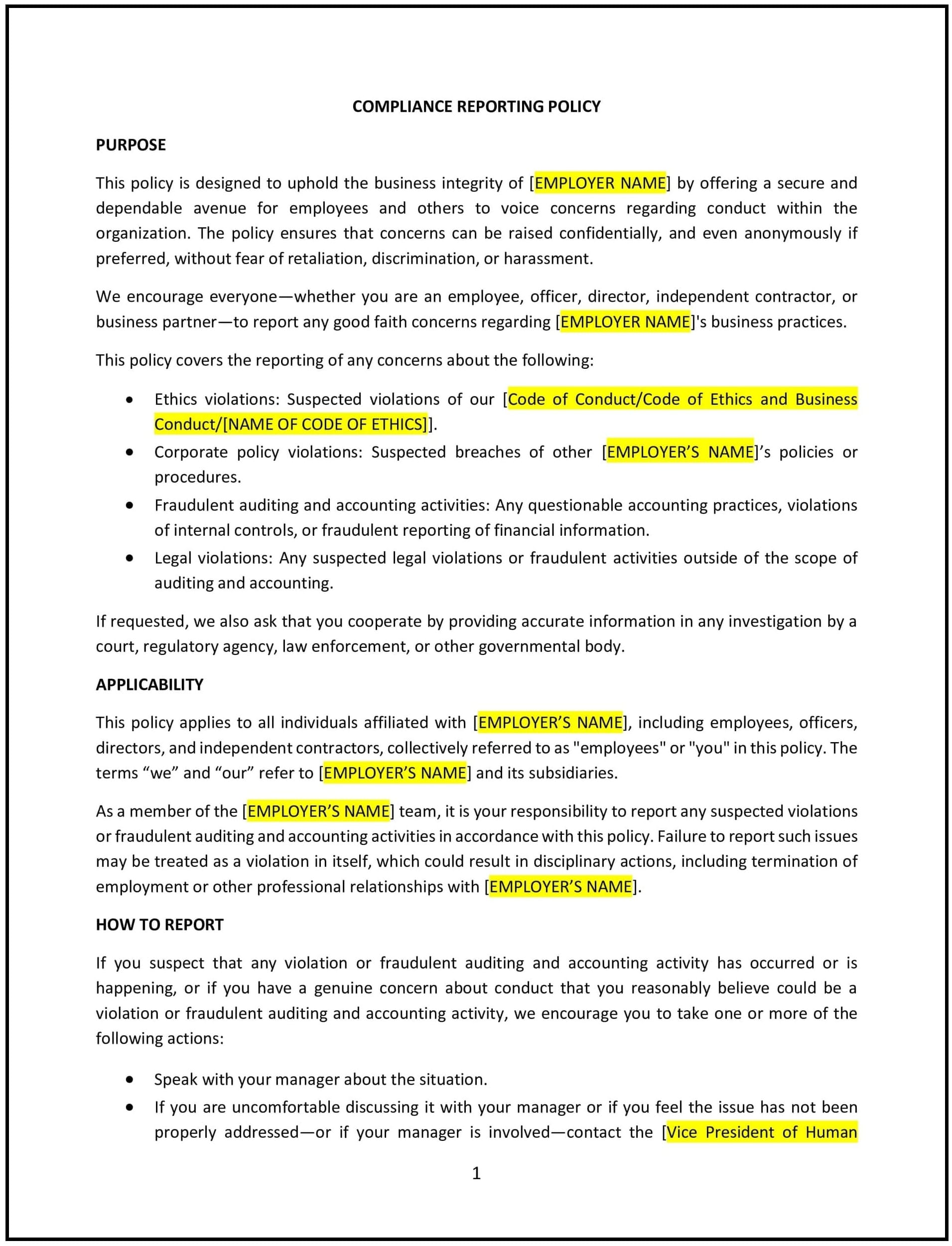Compliance reporting policy (Wisconsin): Free template
Got contracts to review? While you're here for policies, let Cobrief make contract review effortless—start your free review now.

Customize this template for free
Compliance reporting policy (Wisconsin)
A compliance reporting policy helps Wisconsin businesses establish clear guidelines for reporting any violations of company policies, legal requirements, or ethical standards. This policy outlines how employees should report compliance issues, the steps for investigating reports, and the protection of whistleblowers to ensure transparency and accountability.
By implementing this policy, businesses can improve their adherence to legal and ethical obligations, mitigate risks, and create a culture of integrity and transparency within the organization.
How to use this compliance reporting policy (Wisconsin)
- Define compliance issues: Specify the types of issues that should be reported, such as violations of company policies, regulatory non-compliance, unethical conduct, fraud, harassment, or discrimination.
- Set reporting channels: Outline the available channels for reporting compliance concerns, including direct supervisors, HR, designated compliance officers, or anonymous reporting mechanisms.
- Ensure confidentiality: Guarantee that reports will be treated confidentially, and specify the steps the company will take to protect the identity of those who report compliance issues.
- Provide protection against retaliation: Clearly state that employees will not face retaliation for reporting compliance issues in good faith. Include examples of retaliation and the consequences for retaliatory actions.
- Outline the investigation process: Define how compliance reports will be investigated, including the process for handling complaints, documenting findings, and taking corrective actions.
- Set deadlines for reporting: Establish a timeline for when compliance issues should be reported, and encourage employees to report concerns as soon as possible to minimize risks to the business.
- Encourage proactive compliance: Promote a proactive approach to compliance by encouraging employees to ask questions, seek guidance, or raise concerns if they are unsure whether their actions are in compliance with company policies or regulations.
- Clarify consequences for non-compliance: Specify the potential consequences for employees who fail to comply with the policy or for those found to have violated the company’s ethical standards, including disciplinary action or termination.
Benefits of using this compliance reporting policy (Wisconsin)
This policy offers several benefits for Wisconsin businesses:
- Protects the company’s reputation: By addressing compliance issues promptly, the policy helps prevent legal violations, regulatory fines, or damage to the company’s reputation.
- Mitigates risks: The policy helps businesses identify potential risks early, ensuring that corrective actions can be taken before issues escalate.
- Promotes a culture of integrity: By providing clear guidelines and protections for whistleblowers, the policy fosters a work environment where employees feel comfortable reporting concerns and where ethical behavior is encouraged.
- Enhances legal and regulatory compliance: The policy helps the company meet its legal and regulatory obligations by aiming to identify, report, and address any non-compliance issues in a timely manner.
- Enhances employee trust: When employees see that compliance issues are taken seriously and that they can report concerns without fear of retaliation, it strengthens trust in the company’s leadership and policies.
Tips for using this compliance reporting policy (Wisconsin)
- Communicate the policy clearly: Ensure that all employees are aware of the policy and understand how to report compliance issues, the protection they will receive, and the process for investigating concerns.
- Promote transparency: Encourage a transparent culture where employees feel comfortable speaking up about compliance concerns, knowing that their voices will be heard and addressed fairly.
- Offer training: Provide training to employees on what constitutes compliance issues, how to report concerns, and how to handle situations where they are unsure of the proper course of action.
- Be proactive in addressing issues: Actively encourage employees to report concerns early and ensure that all reports are investigated thoroughly and promptly.
- Review periodically: Regularly review the policy to ensure it supports compliance with Wisconsin state laws, federal regulations, and company practices, and update it as necessary.